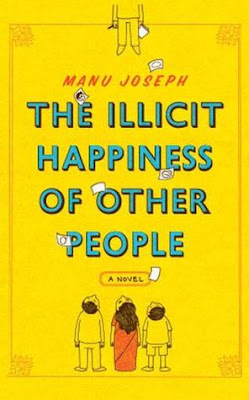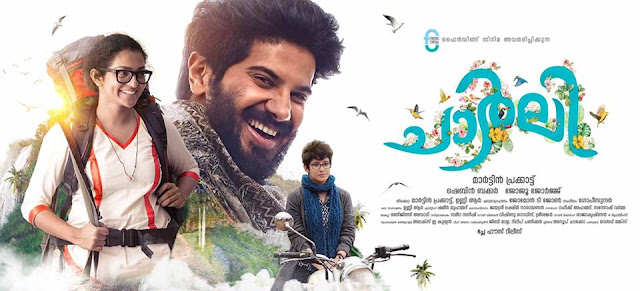The Illicit Happiness of Other People by Manu Joseph
This has been one hell of an emotional rollercoaster ride for me. The Illicit Happiness of Other People by Manu Joseph started off as a darkly comic satire on life in the streets of the 90's Madras. Where getting into IITs or going abroad is a tradition for the Tam-brahm boys and where singing is a national pastime for the girls, who are protected fiercely as the shining family heirlooms - and where the parents head off to their respective offices in their old Bajaj Chetak or Vespas. We are introduced to the rebellious Kottayam Christian family of the Chackos - the anarchist Ousep, with his undying desire to rebel-yell against the societal conforms through not just his journalistic columns or reporting during the day but also his drunken anti-social antics at night. Then there is the 'brilliant' Mariamma a postgraduate in economics and housewife, who everybody in the street knows is a little bit of a cuckoo as she talks to imaginary beings, wagging an accusatory finger - but is also secretly plotting on ways to kill her nuisance of a husband, Ousep. Then there is Thoma - a timid thirteen-year old, whose life is overshadowed by his larger-than-life sibling Unni, his terrifying apparition of a mother and his abusive drunkard of a father. And then there is his burning unrequited pure love for his neighbor Mythili, 3 years his senior.
This is the life on Balaji Lane into which we are thrust as the novel opens. There is this one event that happened 3 years ago, that hangs large on the lives of the Chacko family. Their elder son, Unni Chacko - in all ways, a model son and a rising star among his friends circles, the symbol of life itself, fell from the balcony (committed suicide?), leaving everybody baffled. And three years later as the novel opens, Ousep has stumbled upon a curious set of comic-strips made by the talented Unni, which could hold the key to the mystery shrouding Unni's death.
Written in a scathingly sharp prose that cuts away the veneer of anything 'ordinary' about this dysfunctional family trying to desperately find closure after their son's death, Manu Joseph's brilliant sophomore effort is a lot of things rolled into one. At once a dark satire, rambling ruminations on finding happiness, a precise on the process of grief and also at the same time, a twisted weird mystery that wraps philosophy, psychology and lots more within its slim bulk. It is a clever book - that drops wry observations on the way of life, in that 90's Madras, a place that retains a very strong cultural identity. Manu proceeds to drench the pages of his story with this very identity in Madras, the version pre-1991 reforms. (Manu actually goes on to claim in the acknowledgements that he was 'glad that Madras wasn't a paradise then.")
The story is about how the Chackos war against the apathetic, despicable society they live in, giving us a peekaboo into the lives of their neighbors and lots of Unni's ex-classmates. Manu effortlessly sweeps us into this story where our leading man Ousep valiantly tries to uncover the reasons behind his son's death and the mysterious stories in his comic books. The fourth main protagonist Unni is the spectre that rises off the pages as we peel back the layers of the mystery of his death. His father, Ousep who has never been a 'good' father (According to Ousep's own guilty admission, do things like bother to take young Unni on his shoulders to see the circus or encourage his prodigious talents in making comics etc) to Unni when he was alive, ironically strives hard to understand, rediscovering the real boy after his death through interviews with his classmates. This leads him down a labyrinthine maze, as he tries to piece together Unni's last days and stumbles upon this 'illicit pursuit of happiness'. Try and understand the meaning of life. The characters are brilliantly rendered, including even the side-plots that involve Meenakshi, their sixteen year old neighbour who was in a way, infatuated with Unni - in the exact same way that Thoma, Unni's younger brother - now thirteen and thoroughly confused by what he wants in life - is infatuated with her.
What began as a comical satire on the set way of life in the by-lanes of Madras slowly delves into darker territories while tracing the past and unraveling the mystery of Unni's death through his comic-art and his last days with his close set of friends in school. Manu takes a bold potshots at multiple taboo topics, including molestation, matrimonial abuse, depression, immersing us deeper into this story. Come find out your favourite Chacko among these darling characters, real, broken and valiantly fighting for their own versions of truth and justice in life. Definitely one of the best books I have read, that traces our complex, meaningless lives in a well realised milieu of the 90's Madras.




Comments